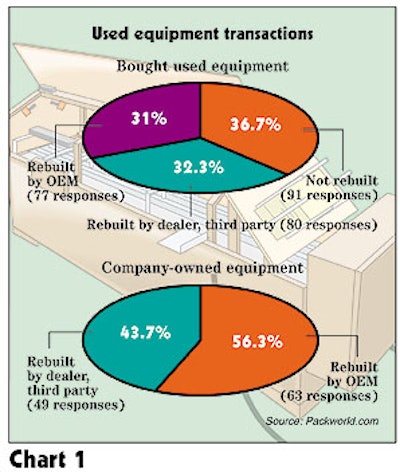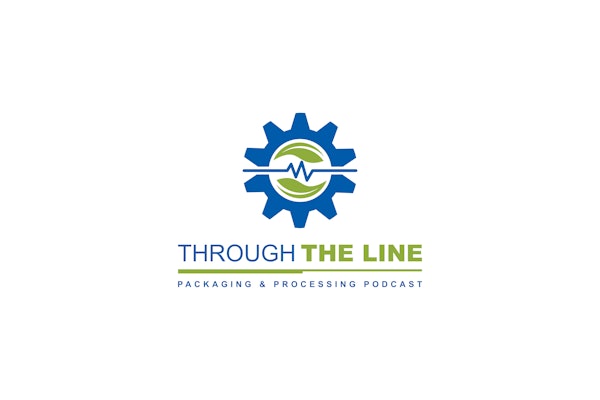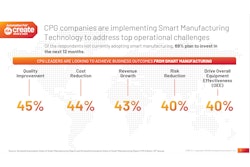Virtually every time that Packaging World asks packaging people to comment on a subject, the vast majority of responses are negative, often scathingly so. In fact, the editors suspect that packagers often participate in surveys based on whether they’ll be given a chance to vent their feelings. In the online survey about experiences with buying used or rebuilt equipment, or having company-owned machines rebuilt (see p. 50), the questionnaire did ask the participants to identify changes in the process they’d like to make or changes they’d like the OEM or third party company to make. Frankly, one of the most common responses to this question was that the individual simply didn’t want to go through the process again. A representative of a large Midwest beverage producer obviously hadn’t had a good experience. His comment about the types of changes he’d like to see in the arrangement next time: “Don’t want to deal with another.” That was echoed by a packaging buyer at a medium-sized Midwestern medical company. The next time, she said, it will be “done by someone else.” The respondent from a major national food packer was similarly unhappy. “I’m not sure I would go through that process again,” he commented. Buying rebuilt equipment brought sour memories to a participant from a Southeastern beverage company: “Next time, we would not buy a rebuilt machine, but a new one.” The participant from a small meat processor in the Southwest agreed, saying his company would probably buy “new” in the future.
Feasibility questioned Another major national food processor didn’t view the process as economically feasible. “In most cases, we’ve ended up spending as much for a ‘rebuilt’ old machine as a new one would have cost. A new one would have worked better,” emphasized that company’s respondent. A mid-sized food processor in the Northeast felt the same. Its respondent said he would seek a “more thorough cost comparison of new versus rebuilt by the original equipment manufacturer.” And he said he would also pay more “attention to the advantages with the new-generation equipment.” A major national chemical producer simply doesn’t buy rebuilt machinery. Its representative noted that the “time and effort to both rebuild and maintain old machinery usually exceeds the savings” gained from buying rebuilt vs new equipment. A small food processor in the Pacific Northwest believed that the machinery-rebuilding contract should include penalties. Its representative suggested that the rebuilder “should accept all shipping costs to return the machine, if the rebuild turns out to be a joke.” Another recommended a penalty when the timetable isn’t met. The participant with a mid-sized fruit processor in the Mountain States would like to see the OEM provide “a more realistic timetable for the actual completion of the project.” He also called for the contract to stipulate “financial penalties for late deliveries.”
Better upfront communications Beyond those participants who were disgusted with their company’s experiences with used/rebuilt equipment, many others simply suggested improvements for the process. The most obvious one–improved communications between buyer and seller–was mentioned in several ways. The representative of a large dairy in the Midwest said that it was important to establish a dialog with the equipment vendor before a contract was signed. “We should have [formal] recommendations from the vendor on how the rebuild will increase throughput, improve functionality and reduce downtime, rather than just having the machine rebuilt back to its original design,” he stressed. The participant from a major national manufacturer of medical products agreed. “I think we need to spend more time upfront deciding what specific changes we want,” he said. Recalling a recent project, he added, “several additional changes came to mind when we were already deep into the rebuild process.” A personal care products maker believed much the same. The respondent from this Northeastern company said he’d seek “more meetings to determine how the final product was to be made, and to learn how the [machinery] modifications would ‘enhance’ the process.” The participant from a major national brewer also sought improved communications and related what can happen without it. “We should spend more time upfront detailing expectations and needs. That’s because we have experienced far too many start-up delays and inefficiencies without this step in the past.” Performance guarantees Several participants said they would seek some sort of machine performance guarantee, indicating that a previous packaging machine project might have fallen short of expectations. The representative of a major tobacco products manufacturer in the Southeast said his company planned to “tie performance of the machine into the contract for machine acceptance, including a penalty clause for noncompliance.” The representative of a large bakery in the Midwest agreed. He pointed out: “We will require observed performance demonstrations by the vendor prior to accepting the machine and completing payment.” A participant with a manufacturer of automotive parts had the same idea. He reported that his company “needs to develop a very specific ‘performance test’ standard.” The representative from a national packer of frozen foods in the Northwest put it this way: “We need the OEM to be more accountable for the daily performance of the machine.” An acceptance process very similar to that of new machinery was the idea from a representative of a soft drink maker in the Northeast. This company “wanted to commission rebuilt equipment [at the vendor] prior to shipment” to its plant.
More specific changes A number of participants seemed to feel that the companies performing the rebuilds didn’t provide enough resource material when the machine was completed. One, from a mid-sized bakery in South Florida, asked for a “spare parts kit and training personnel brought to our plant at no additional charge.” A large cosmetics company in the Southeast echoed that. Its representative said his company sought to “obtain component and parts drawings that would enable mechanics to have an easier time ordering spare or replacement parts.” This was seconded by the representative of a large food packer in the Northeast. He said he wanted the OEM to “leave behind a good set of prints and diagrams for my maintenance department.” The respondent from a large food processor sought “better service and set-up assistance, along with better information in the operators’ manuals.” A small pharmaceuticals manufacturer in the Southwest called for “detailed training and a set-up contract.” A large pharmaceutical manufacturer in the Mountain States scolded the OEMs. Its representative said: “The OEMs need to keep the specs more up to date on the old equipment, so the retrofit goes more smoothly and is better integrated.” The participant from a small consumer products maker in the Midwest said he believed used equipment should come “with an extended warranty.” A large manufacturer of appliances outside the United States wants OEMs to be more flexible when rebuilding machines. Its representative sought “more willingness to customize a machine for my specific needs.” Based on what might be described as an incomplete experience, a participant from a mid-size food company in the West responded with sarcasm to the question of what he would change the next time. “HMI systems that include the software system with the equipment would be nice,” he said. One representative of a Mexican household products manufacturer said his company sought the maximum in versatility: “We want a machine with a flexible capability to fit within different production lines [requiring] minimum changeover, maintenance and fixtures.” Finally, another unhappy respondent summed up the frustration of many survey respondents. “I will most likely not buy another used packaging machine,” said the respondent from a West Coast maker of home products. “But if I do, it will be rebuilt by a third party before it’s installed into any of our plants.”



























